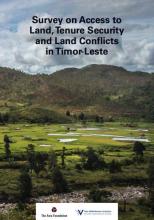Land Library
Welcome to the Land Portal Library. Explore our vast collection of open-access resources (over 74,000) including reports, journal articles, research papers, peer-reviewed publications, legal documents, videos and much more.
/ library resources
Showing items 1 through 9 of 22.Presents a framework for tackling urban-rural land challenges. Designed to help a range of stakeholders in developing countries understand how to adopt an inclusive approach to land management and administration initiatives to produce a balance in urban and rural development.
This study aimed to pilot an innovative land survey to provide quantitative data regarding landrelated issues in Timor-Leste, in order to support the Timorese government and parliament in developing evidence-based land policies and legislation, as well as more informed advocacy of civil society.
Despite progressive provisions on gender equality in Tanzania’s land laws, women have little representation in land allocation decisions. Mainstreaming gender in local regulations can help address this problem.
Large-scale agricultural investments impact upon men and women in different ways, yet women’s voices and interests are not always heard in decisions about land.
Covers why do we need to think about policies to formalise land rights in developing countries?; primarily a political issue; policies to formalise land rights are not a panacea; inclusive formalisation policies present considerable challenges.
The Guiding Principles are designed to help a number of stakeholders develop larger-scale agricultural investments that are more likely to prove sustainable, beneficial, and successful for communities, investors and governments.
Contains 6 chapters: introduction, accountability issues in urban land management, transparency and accountability in communal land management, corruption and land reform programmes, accountability issues in large scale land deals, gender, youths and land corruption.
There are gender-differentiated impacts when land is harnessed for commercial investment.
Key findings: Customary tenure remains strong with only 1.2% of plots held under statutory tenure. Over 86% of women reported they have access to land under customary tenure and c.63% of women reported they “own” land under customary tenure.


